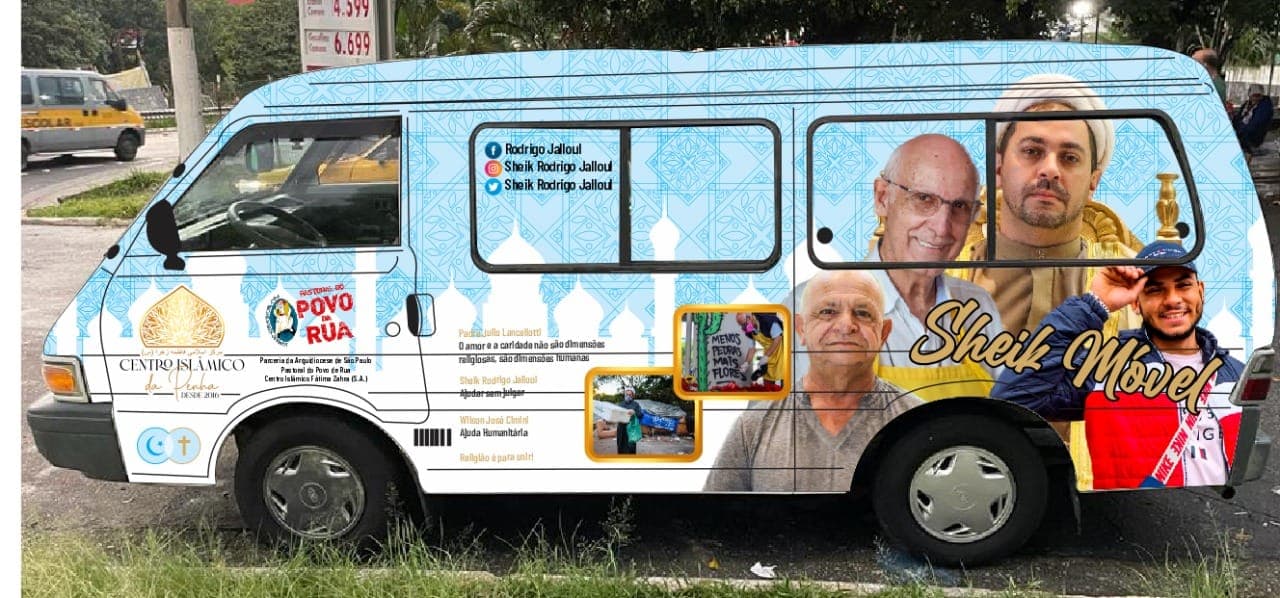SÃO PAULO – In the eastern section of São Paulo – the largest and poorest part of the city, where a third of the city’s 12.3 million residents live – a van with the pictures of a priest and a Muslim sheikh travels the streets.
The eye-catching vehicle, called “Sheikh-móvel” (Sheikh-mobile) by its owner, the Shi’a leader Rodrigo Jalloul, has a picture of Father Júlio Lancellotti, whose work with the poor led him, years ago, to be named the Archdiocese of São Paulo’s vicar for the homeless.
In fact, Lancellotti played a fundamental role in the creation of the Sheikh-mobile, a vehicle used every day by Jalloul and his colleagues to distribute hot meals for the homeless in Penha, the neighborhood where his Islamic center is located.
Lancellotti and Jalloul first met a couple of years ago, during a TV show featuring different religious leaders. Before the COVID-19 pandemic, Jalloul was already visiting Lancellotti’s parish every Monday to help him offer breakfast for the homeless, something that the priest has been doing for several years.
“He taught me many things about his work. He showed me that it is not simply about giving food to the poor, but about being with them,” Jalloul told Crux.
The first Brazilian-born Shi’a cleric, Jalloul studied in Qom, Iran, to obtain the title of mullah. In 2013, after visiting Brazil, he was forbidden from returning to Iran, probably because he had criticized an important sheikh in the country. Since then, he said, Iran has been waging a campaign against him and telling the Shi’a community that he is not a real sheikh.
Jalloul ended up pursuing his own autonomous path in order to establish his community. His charitable work, along with Lancellotti, has been an integral part of the journey.
“Father Lancellotti advised me to build a strong social action perspective in my Islamic center, something that many times the Muslim community in Brazil forgets to do. He has been a great mentor,” Jalloul said.
Since then, they have organized two Christmas celebrations together, in which they distributed a special breakfast for the homeless and invited leaders of other faiths to join them. Lancellotti has also accompanied Jalloul several times to give meals to people on the street.
At the beginning of 2022, Jalloul’s car broke down and he wasn’t able to keep feeding the homeless for several days.
“The priest realized that something was going on and asked about my car. I had launched an online campaign in order to collect money. Then he told me to go see him at his parish,” he recalled.
Lancellotti donated money from the Vicariate for the Homeless to the Muslim cleric, so he could buy a new vehicle. That is when the Sheikh-mobile was born.
Jalloul decided to decorate the van with pictures of him and Lancellotti, along with his adoptive father and his cousin, who work with him on the streets. It also includes the names of the Islamic center and of the pastoral for the homeless people.
“That is a work carried out by many people who have the same commitment to the poor and the homeless,” Lancellotti told Crux.
“On the streets, some people used to think that [Jalloul] was a priest too. Others did not understand who he was. But the reception is usually positive,” he added.
Jalloul said that many Muslims used to see Catholic priests as idolatrous, but Lancellotti’s work showed them the strength of his faith.
“They also saw how the priest respected us. That process gave them an opportunity to rethink their prejudices,” he said.
Their joint charitable work also has contributed to lessening anti-Muslim sentiment among many people in São Paulo, according to the sheikh.
“When people saw me wearing my garments, they usually joked around. ‘There goes the bomb man,’ somebody would always say. Now they say: ‘Look, there goes Fr. Lancellotti’s sheikh,’” Jalloul said.
The interfaith group has been growing. According to Jalloul, their project is encouraging leaders from all religions to do a similar work with the homeless.
“Sao Paulo’s homeless population was officially estimated in more than 30,000 people, but we think the real number is much higher. We cannot help all of them alone, but maybe together we can reach many of them,” he affirmed.
The sheikh’s activism has been getting media attention, but he denied that his intention is religious proselytism through charity.
“It is not about disseminating religion but giving the example and serving God’s will. He wants us to help and love each other,” he said.
Lancellotti says the way he, Jalloul, and other leaders have been building an interfaith dialogue can also help people to rethink their roles in society and as religious people.
“We do not reunite to discuss doctrine or theology but to work together for the poor,” he said.











